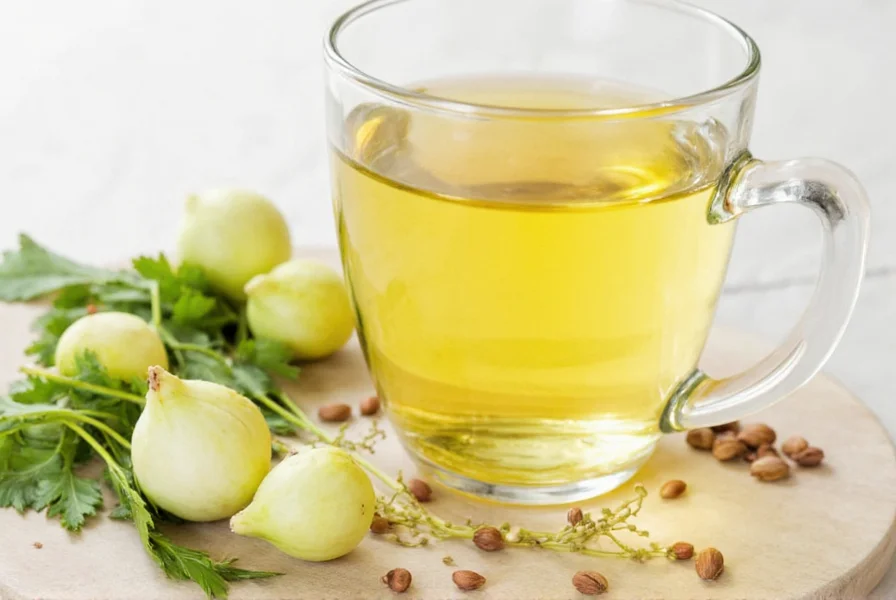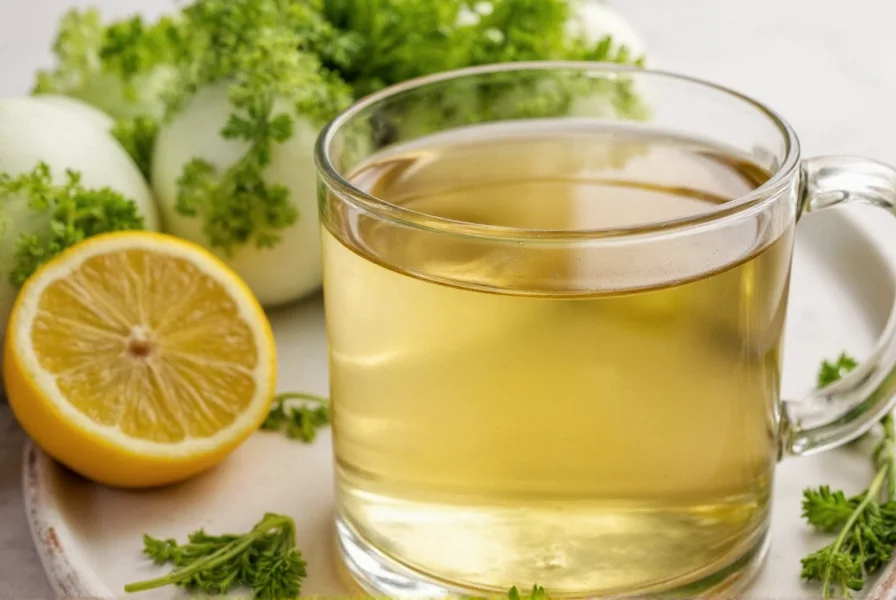Fennel tea, brewed from the seeds of Foeniculum vulgare, has been used for centuries across Mediterranean and Asian cultures as a natural remedy. Modern research continues to validate many traditional uses of this aromatic herbal infusion. Unlike many commercial digestive aids, fennel tea works through multiple physiological pathways to deliver gentle, effective relief for common digestive complaints.
What Makes Fennel Tea Unique
Fennel seeds contain approximately 2-7% essential oil, with anethole comprising 50-80% of this oil. This compound gives fennel its distinctive licorice-like flavor while providing significant therapeutic effects. Additional beneficial components include:
- Flavonoids with antioxidant properties
- Volatile oils including fenchone and estragole
- Dietary fiber that supports gut health
- Minerals like potassium and selenium
| Key Compound | Natural Concentration | Primary Health Benefit |
|---|---|---|
| Anethole | 50-80% of essential oil | Digestive relief, anti-inflammatory |
| Flavonoids | 0.5-2.0% | Antioxidant protection |
| Fenchone | 10-20% of essential oil | Respiratory support |
| Estragole | 5-15% of essential oil | Antimicrobial properties |

Science-Backed Digestive Benefits
Fennel tea's most well-documented advantage involves digestive health. Multiple clinical trials demonstrate its effectiveness for:
A 2020 double-blind study published in Complementary Therapies in Medicine found that participants with irritable bowel syndrome who consumed fennel tea twice daily for 4 weeks experienced significant reductions in abdominal pain, bloating, and flatulence compared to the control group. The tea's antispasmodic properties relax gastrointestinal muscles while its carminative effects help expel gas.
Research indicates fennel tea may also support:
- Relief from infant colic (when consumed by breastfeeding mothers)
- Improved nutrient absorption
- Reduction of nausea and vomiting
- Management of functional dyspepsia
Anti-Inflammatory and Antioxidant Properties
The flavonoids and phenolic compounds in fennel tea combat oxidative stress throughout the body. A 2021 analysis in Antioxidants journal identified 8 distinct antioxidant compounds in fennel seeds that work synergistically to neutralize free radicals.
Regular consumption of fennel tea may help reduce inflammation markers like C-reactive protein and interleukin-6. This makes it potentially valuable for managing chronic inflammatory conditions when used as part of a comprehensive approach.
Hormonal Balance Support
Fennel contains natural phytoestrogens that may help regulate hormonal fluctuations. A clinical trial with 79 postmenopausal women showed that those who consumed fennel extract daily for 8 weeks experienced significant reductions in hot flashes and other menopausal symptoms compared to the placebo group.
While more research is needed, preliminary evidence suggests fennel tea might also support:
- Menstrual cycle regulation
- Reduction of PMS symptoms
- Lactation support for breastfeeding mothers
Respiratory and Immune Benefits
The volatile oils in fennel tea, particularly fenchone, act as natural expectorants that help clear mucus from airways. This makes fennel tea particularly valuable during cold and flu season.
Additional respiratory benefits include:
- Soother for sore throats and coughs
- Natural decongestant properties
- Antimicrobial effects against common respiratory pathogens
- Reduction of inflammation in airways

How to Prepare Fennel Tea for Maximum Benefits
To extract the maximum therapeutic compounds from fennel seeds:
- Crush 1-2 teaspoons of whole fennel seeds to release essential oils
- Pour 8 ounces of freshly boiled water over the seeds
- Cover and steep for 5-10 minutes (longer steeping increases potency but may intensify flavor)
- Strain and enjoy plain or with a squeeze of lemon
For digestive issues, consume 30 minutes before meals or 1 hour after meals. For respiratory benefits, drink 2-3 times daily while symptoms persist.
Potential Side Effects and Precautions
Fennel tea is generally safe for most adults when consumed in moderate amounts (2-3 cups daily). However, certain precautions apply:
- Pregnant women should limit consumption as high doses may stimulate uterine contractions
- Individuals with estrogen-sensitive conditions should consult a healthcare provider
- Rare allergic reactions may occur, particularly in those sensitive to celery or carrots
- Excessive consumption (more than 5 cups daily) may cause nausea or dizziness
Always consult with a healthcare professional before using fennel tea therapeutically if you have underlying health conditions or take medications.
Conclusion
Fennel tea represents a time-tested herbal remedy with growing scientific validation for multiple health benefits. Its gentle yet effective action on digestive, inflammatory, and hormonal systems makes it a valuable addition to a wellness routine. When prepared properly and consumed in appropriate amounts, fennel tea offers a safe, natural approach to supporting overall health without significant side effects for most people.
Frequently Asked Questions
Can fennel tea help with weight loss?
Fennel tea may support weight management through several mechanisms. Its natural diuretic properties can reduce water retention, while its fiber content promotes satiety. More importantly, fennel tea helps regulate digestion and reduce bloating, which can create a flatter abdominal appearance. However, it's not a magic solution for weight loss and should be part of a comprehensive approach including proper nutrition and exercise.
How often should I drink fennel tea for digestive benefits?
For optimal digestive benefits, consume fennel tea 30 minutes before meals or 1 hour after meals. Most studies showing positive effects used 2-3 cups daily. Consistent daily consumption over 2-4 weeks typically yields the best results for chronic digestive issues like IBS or bloating. For acute digestive discomfort, a single cup may provide relief within 30-60 minutes.
Is fennel tea safe during pregnancy?
While small amounts of fennel tea are generally considered safe during pregnancy, high doses should be avoided. Fennel contains compounds that may stimulate uterine contractions in large quantities. Most healthcare providers recommend limiting consumption to 1 cup daily during pregnancy and avoiding therapeutic doses. Pregnant women should always consult their healthcare provider before using fennel tea medicinally.
Can fennel tea interact with medications?
Fennel tea may interact with certain medications due to its effects on liver enzymes. It potentially affects the metabolism of drugs processed by CYP3A4 enzymes, including some blood thinners, anticonvulsants, and hormone therapies. Individuals taking medications should consult their healthcare provider before consuming fennel tea regularly, especially if taking medications with narrow therapeutic windows.
How does fennel tea compare to other herbal digestive teas?
Fennel tea offers unique advantages compared to other digestive herbs. Unlike ginger which can be too stimulating for some, fennel provides gentler relief. Compared to peppermint tea which may worsen acid reflux in some people, fennel tea is less likely to relax the lower esophageal sphincter. Fennel's combination of antispasmodic, carminative, and anti-inflammatory properties makes it particularly effective for bloating and gas relief, while chamomile works better for general relaxation and sleep support.











 浙公网安备
33010002000092号
浙公网安备
33010002000092号 浙B2-20120091-4
浙B2-20120091-4